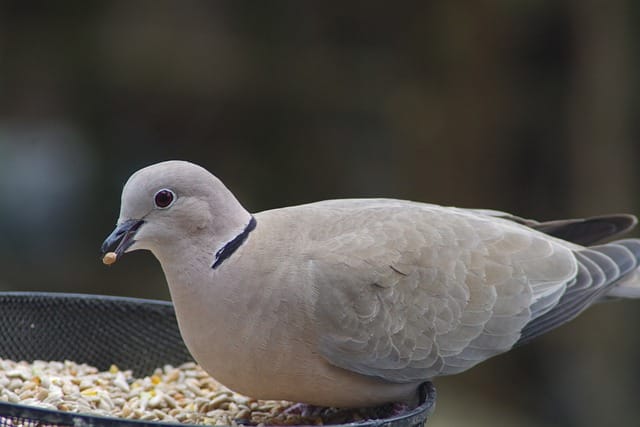The Ringneck Dove is a symbol of grace and tranquility, cherished for its easy care and serene personality. Known for their soft cooing and elegant appearance, these birds make wonderful companions, whether kept solo or in pairs. Their adaptability and affectionate nature have solidified their status as a beloved pet worldwide.
Key Features of the Ringneck Dove
- Elegant Appearance
- Ringneck Doves are medium-sized birds, measuring about 10–12 inches in length.
- They are named for the subtle black or gray “ring” marking on the back of their neck.
- Plumage colors vary, with shades of white, fawn, gray, and tan being most common.
- Gentle and Social Nature
- These doves are known for their docile demeanor, making them easy to handle and bond with.
- They enjoy the company of their owners and other birds but can also thrive independently.
- Soft, Soothing Cooing
- Their gentle cooing is pleasant and adds a calming ambiance to any environment.
Caring for Ringneck Doves
- Dietary Needs
- A balanced diet ensures their health and vitality:
- Seeds and Grains: Dove-specific seed mixes containing millet, safflower, and cracked corn.
- Fresh Produce: Small amounts of chopped greens like spinach or kale as supplements.
- Calcium Sources: Provide cuttlebone or mineral blocks to support egg production and bone health.
- Fresh Water: Must always be available and replaced daily.
- A balanced diet ensures their health and vitality:
- Housing Requirements
- Ringneck Doves need spacious cages (minimum 18x18x24 inches) with horizontal bars for perching.
- Place perches of varying sizes and textures to prevent foot fatigue.
- Provide a clean, draft-free environment with soft bedding to ensure their comfort.
- Exercise and Enrichment
- Allow supervised out-of-cage time for flight in a safe, enclosed area.
- Introduce toys like swings and natural branches for stimulation.
- A nesting bowl or box can also provide comfort and enrichment.
- Health and Maintenance
- Keep their environment clean to avoid respiratory issues or parasites.
- Monitor for signs of illness, such as fluffed feathers or lethargy.
- Trim nails periodically and consult an avian vet for regular checkups.
Why Ringneck Doves Are Popular Pets
- Ease of Care
- Their simple diet and minimal grooming needs make them ideal for beginners.
- Gentle Companionship
- Ringneck Doves are affectionate without being overly demanding, offering a soothing presence.
- Adaptability
- These birds adjust well to various living situations, including small apartments.
- Long Lifespan
- With proper care, Ringneck Doves can live 10–15 years or more, making them a long-term companion.
Challenges to Consider
- Limited Interaction: While gentle, Ringneck Doves are not as interactive as parrots and may prefer observation over hands-on play.
- Space Needs: Despite being medium-sized, they require ample room for flight and perching.
- Sensitive to Cold: Ensure their environment is warm and free of drafts, as they are sensitive to temperature changes.
Why Ringneck Doves Are Popular in the USA
The Ringneck Dove’s blend of elegance, gentleness, and ease of care has made them a household favorite in the United States. Their calming presence and soothing coos bring peace to homes, making them ideal for pet owners seeking serenity.
Is a Ringneck Dove Right for You?
If you’re looking for a low-maintenance, elegant bird with a gentle nature, the Ringneck Dove is an excellent choice. Whether as a solo pet or part of a flock, these doves offer companionship and tranquility, enriching any home.
Discover more about Ringneck Doves and other exotic birds in our Birds section.

